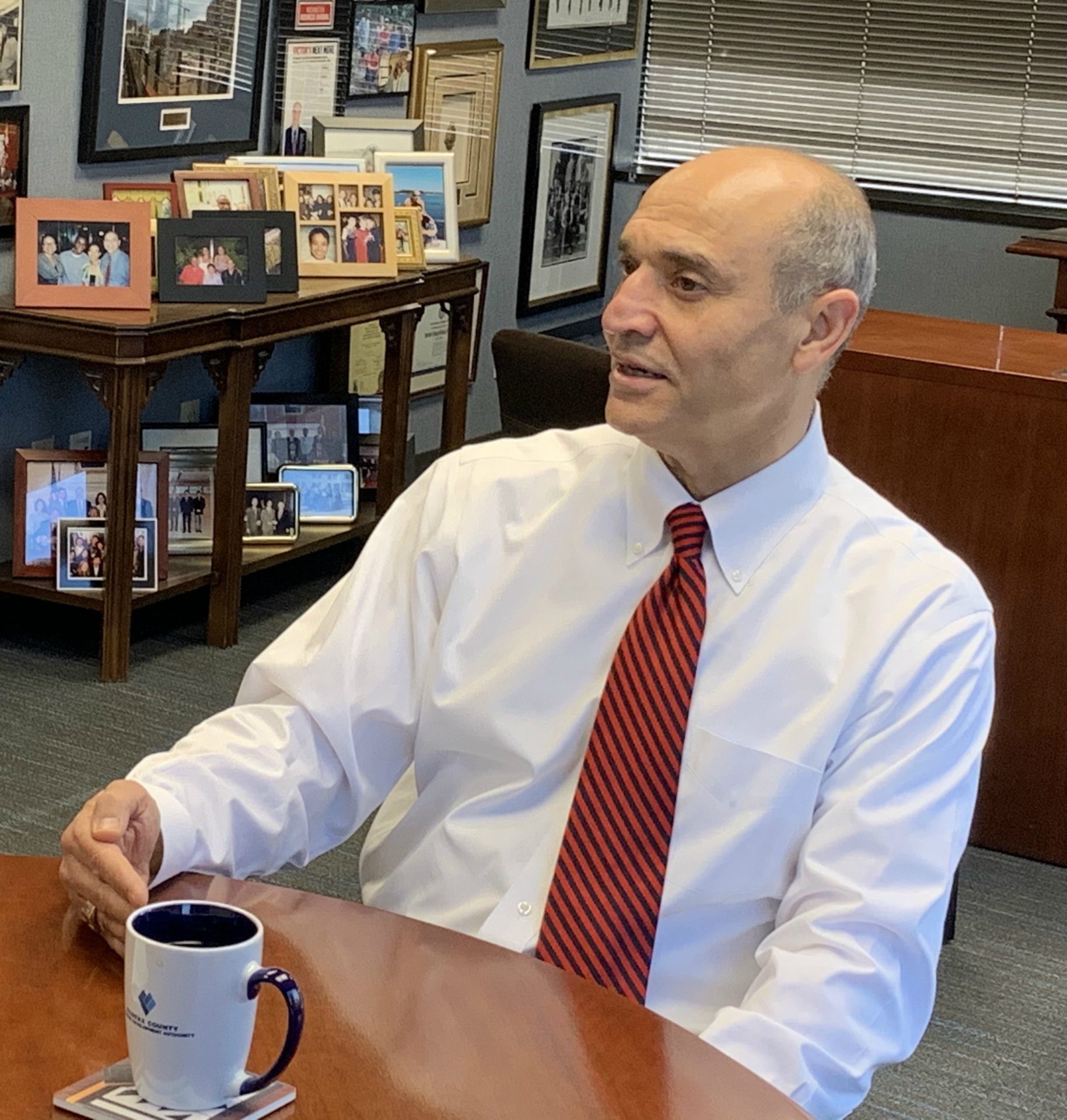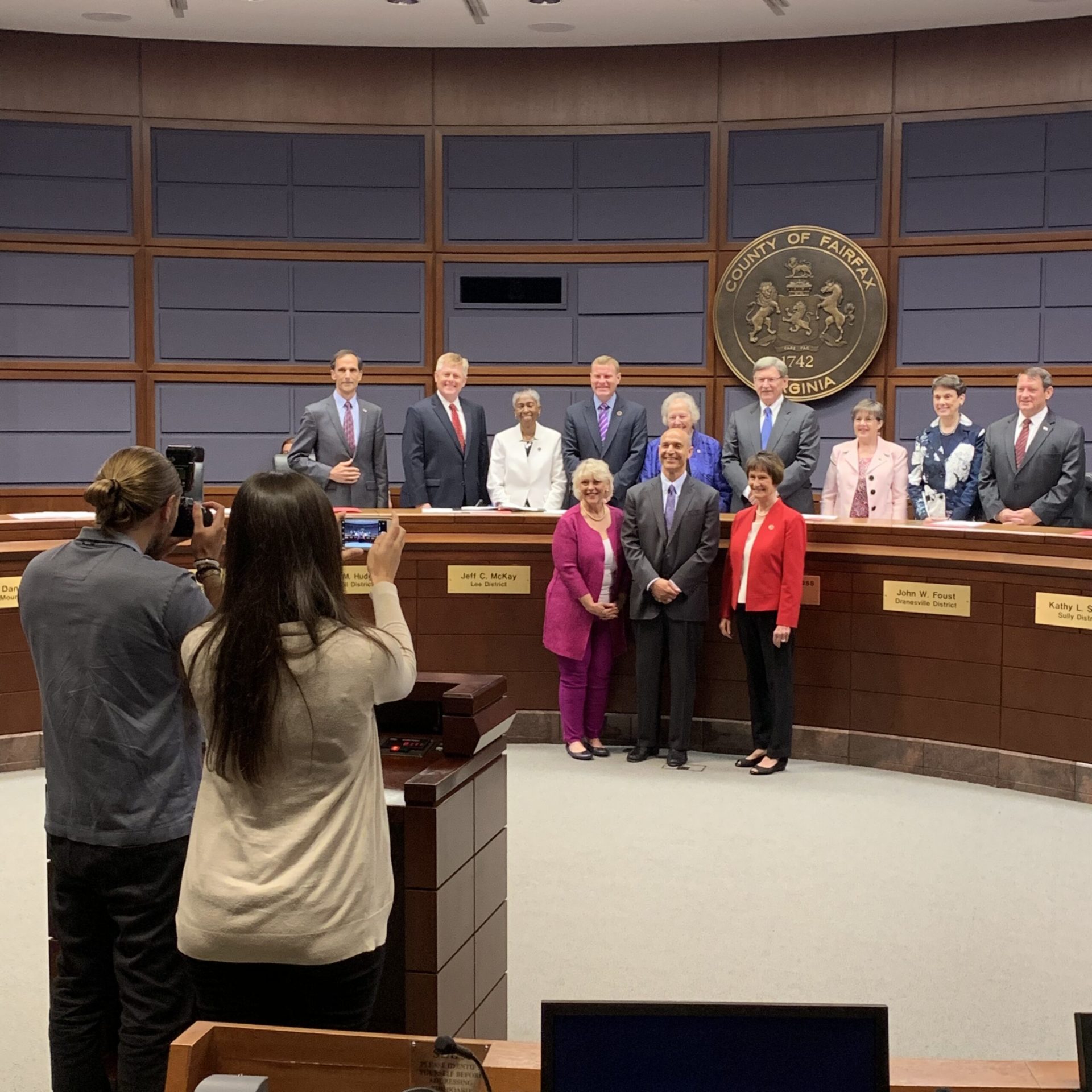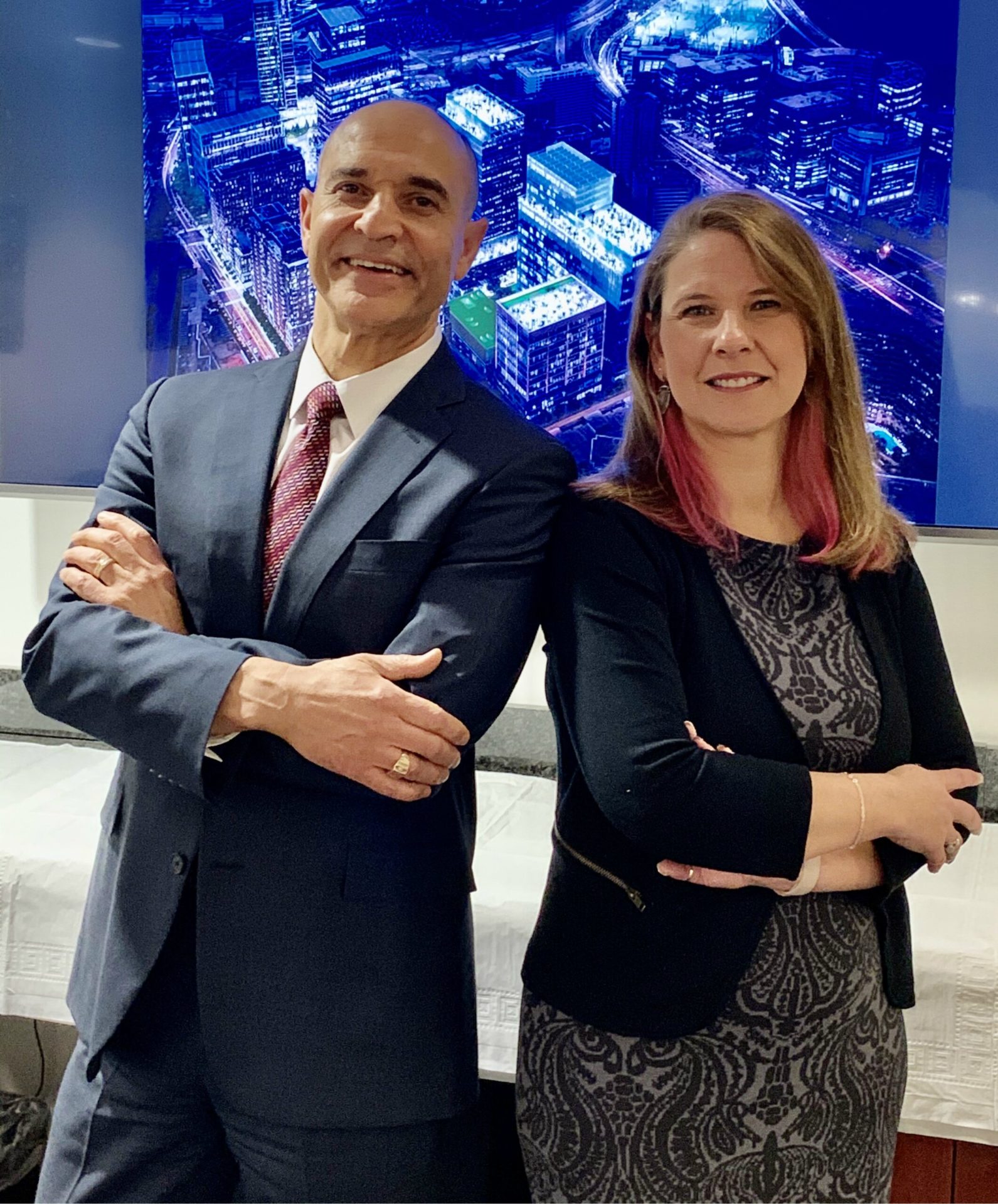E-Newsletter
Victor Hoskins reflects on year 1: collaboration, COVID-19 response, talent initiative
Victor Hoskins took the helm of the Fairfax County Economic Development Authority (FCEDA) on August 5, 2019, after leading economic development in Arlington County for almost five years and winning the biggest economic-development competition in history: Amazon’s second headquarters, aka HQ2.
In the last year Hoskins emphasized greater collaboration with the Fairfax County government, with other economic development organizations in Northern Virginia, and with organizations across the Washington region. He expected to do that. What he couldn’t expect was the arrival of COVID-19, the novel coronavirus, the impact it would have on the area economy, and how the FCEDA would respond to it.
Last week the FCEDA’s communications team talked with Hoskins about the past year and his goals for the future. This text has been edited.
FCEDA: When you look back on the last year, what do you think is your biggest accomplishment?
Hoskins: I have to say that creation of the Northern Virginia Economic Development Alliance has to be one of the biggest accomplishments. I think it bodes well for the future of all of the region. And in order for us to really compete globally, we need the region to compete together. Interregional competition is not healthy. And with two and half million people living in Northern Virginia, that is so much more powerful a statement than Fairfax County alone or Arlington alone or one of the other jurisdictions alone.
FCEDA: What you would say are the biggest accomplishments in its mission to build the Fairfax County commercial tax base?
Hoskins: We had an extraordinary year in terms of our basic bread and butter work, which is leasing space and creating and retaining jobs, especially when you consider COVID-19’s grip on of all of us since March. That really limited our contact with clients, but in May we had an extraordinary announcement: Microsoft leasing 400,000 square feet of research and development and innovation space, hiring 1,500 employees – a $64 million investment. That was spectacular and it was the largest announcement in all of the region so far this year. And of course, earlier in the year, Facebook and Google leased additional space. And, recently, Walmart Labs did too.
FCEDA: What does that say to you about the Fairfax County and Northern Virginia economy?
Hoskins: These are all signs that we have a very, very strong and resilient economy. I mean, all of this is happening right in the middle of a pandemic.
FCEDA: We unveiled the talent initiative that the Fairfax County Board of Supervisors funded last year. What is that going to do for this economy?
Hoskins: The talent initiative is something we never had done in the history of our organization. We really took the idea that it doesn’t matter where the talent comes from, as long as they end up here.
We’ve done two virtual career fairs so far. One was focused on recent college graduates at the end of May, which was perfect timing for all of these graduating seniors and for people who’ve been out of school one to two years. Over a thousand folks participated in that. We had 13 companies that offered more than 3,000 jobs. There were more than 30 universities involved, and we were able to enlist seven historically black colleges as part of that 30. We went from the University of Maryland Eastern Shore, which is a historically black college, to as far south as Duke in North Carolina.
Then we did one in July focused on tech workers, mid-career. We had 17 companies involved in that one including Amazon Web Services, Microsoft, Hewlett Packard Enterprise and Leidos. They offered 4,000 job opportunities and there were about 800 folks that had interviews. So for us, that was really kind of a statement of the things that we could do. And then we did a third one, a joint venture with the Northern Virginia Hispanic Chamber. Again, more than a thousand people attended. Again, multiple companies – 13 at this one. Again, the outcomes were marvelous for both the people who were trying to get hired and the people who had job opportunities.

Victor Hoskins, president and CEO of the FCEDA, in his office before COVID-19 hit. (FCEDA photo)
FCEDA: And of course there is the new talent website (www.workinnorthernvirginia.com) that is specifically aimed at attracting workers to Northern Virginia.
Hoskins: Yes, and it has the theme “Innovation Lives Here,” which is the theme we used to win the HQ2 deal for Arlington and Northern Virginia. When you think about all the centers of innovation here – Amazon HQ2 in Arlington, the innovation campuses that Virginia Tech is building in Alexandria and George Mason University in Arlington, employers like Microsoft, Google, Facebook and MITRE in Fairfax County, Micron in Manassas, the new Northern Virginia Life Science Center in Prince William County, the data centers in Loudoun County and the fact that 70 percent of the world’s Internet traffic goes through Loudoun County – wow, the theme really fits.
FCEDA: [Last] week we saw the Dice.com report on tech-job openings during the second quarter. It seems like we started the talent initiative at just the right time.
Hoskins: The D.C. area actually saw the number of posted tech jobs go up 11 percent over the same time in 2019, and that was during the pandemic! Tech job openings dropped in the other big tech centers like New York and L.A. That Dice survey actually mentioned three Fairfax County companies: Booz Allen Hamilton, General Dynamics and Leidos. That goes to show you how much more resilient this area’s economy is compared to most other parts of the country. As a matter of fact, we have the second-highest concentration of tech workers in the United States, and that allows us to attract companies like Microsoft and Amazon.
That is why these virtual career fairs are so important. That is why the talent initiative is so important. That piece was one of the key things that the county wanted us to really emphasize.
FCEDA: As you mentioned earlier, the EDA has ramped up its collaboration with the county government.
Hoskins: We had done quite a bit with the county, especially the economic initiatives team, but when COVID-19 hit, that really took off.
The Board of Supervisors approved a loan program of $2.5 million, we marketed that and they had more than 1,700 applicants. Then the Board of Supervisors came up with a $25 million direct grant program for small businesses with 50 or fewer employees. We marketed it and they had almost 6,300 applications. The county has gone ahead and put another $20 million into the program, so now it is $45 million! These things require a lot of courage, so we were delighted to collaborate with them.
Now every other week we have a meeting with all the organizations in the county that are that are involved or directly or indirectly involved with economic development. So we are working differently and collaboratively with the county in ways we never have before. The commercial office market is an incredibly important source of revenue for the county. We should always be partners with the county.
FCEDA: One of our favorite examples of collaboration happened when we worked with the county to honor front-line public-works employees.
Hoskins: Deputy County Executive Rachel Flynn was trying to figure out a way to recognize workers in places like the wastewater management, solid waste management and the like who have worked through COVID-19 and don’t have the option to work from home. I contacted a couple who made a big donation and they paid for more than 1,300 meals that were delivered on-site to all of the public works employees by food vendors who really needed the business during the pandemic. I feel like we’re collaborating not just functionally, but we’re collaborating in spirit.

Victor Hoskins, president and CEO of the FCEDA, is introduced to the Fairfax County Board of Supervisors in 2019. (FCEDA photo)
FCEDA: The FCEDA really pivoted quickly to working virtually when the pandemic started.
Hoskins: The first thing is we went from a 10 percent telework to 100 percent telework in 48 hours. And believe me, we were not fully equipped, but we got there. The staff did a brilliant job. We feel like people are equipped to work at home for a while.
In order to increase everyone’s ability to understand what’s going on in the organization, we instituted a Monday morning general staff meeting. Not only is the staff here on the call, but all of our international offices and our California office are too. It has been great to get information from overseas that actually affected the things that we took action on here.
I’ll just give you one quick example. We heard from our Berlin office that one group was laying off and that McDonald’s was hiring – in Germany they put the two together and got jobs for the laid-off workers. So we talked to Walmart and Amazon and all the organizations that were surge hiring, particularly in areas related to distribution and food delivery, and connected them with employees who were being laid off in in retail and hospitality.
FCEDA: You have really emphasized building connections with our businesses during the pandemic too.
Hoskins: Yes, that is so important for us to help our companies bridge this crisis. Our business investment team has really worked hard to get resources to businesses. We used to work with one SCORE mentor. We now provide five. We didn’t have connections to free legal services. Now thanks to our diversity business investment team we are connected with a group that provides free legal counsel.
And with the NOVA EDA we have launched a 12-installment webinar series that is about surviving this rough patch and then growing. That series is for all businesses in Northern Virginia. Remember, every job we save, every business we save, those are households we are saving. And when you save households, you are saving communities.
FCEDA: Tell us a little bit about the regional task force that you’re participating on.
Hoskins: The DMV – D.C, Maryland and Virginia – is really a connected region, and there is a group that has gotten together called Connected DMV to bring the region together because we’ve all been hit by COVID-19. In order for us to recover, we really need to have a strategy that involves all of us.
Very similar to the Northern Virginia Economic Development Alliance, we need an alliance of all of the DMV and Connected DMV is really trying to develop a process to get us there. I’m the member on the task force that’s focused on creating a regional economic development strategy. I just made a recommendation to the board. The task force approved the recommendation, and we are in the process of shaping that recommendation. Some of the task force members are from the private sector and some are from public agencies. I’m really excited about what’s going to come out of this.
FCEDA: What are your other goals for the next year?
Hoskins: I want to see us continue to grow our work in talent initiatives. I would like to see us doing a career fair every two months. If we could do that, that would probably mean hitting 6,000 job applicants. We’re going to do some tech-focused virtual career fairs – cybersecurity or cloud computing, for example.
I would like to see us continue on the diversity focus with historically Black colleges, with the National Society of Black Engineers, with the Society of Hispanic Professional Engineers, with Women in Coding, with Women in Technology, with veterans’ organizations. Those are really strong, fresh opportunities for us to delve into and bring into our businesses.
I would like to see our work with the Northern Virginia Economic Development Alliance continue to grow. I would like to see us continue to build out our talent website that has content from each of the jurisdictions. And I would like to see us do more targeted marketing together.

Victor Hoskins, president and CEO of the FCEDA, emphasizes regional collaboration. Here he is with Christina Winn, executive director of the Prince William County Department of Economic Development. (FCEDA photo)
FCEDA: One thing that you said a year ago when you started was how we need to think bigger, that a bigger team gets bigger results. Did anything about that change in the course of the last year?
Hoskins: I had an interview with Forbes Japan not too long ago. At the end of the interview, the writer asked me, “So what’s your vision for Fairfax County?” I was very clear. My vision is not just Fairfax County but really Northern Virginia – that Northern Virginia is the technology and innovation center for the Western Hemisphere.
I did not say the world. I said the Western Hemisphere. You have to start somewhere. I think we have everything that it takes in Northern Virginia to do that. If we do it right and eventually get linked up with suburban Maryland and D.C., we will be even more competitive.
We compete right now with Shanghai. We don’t think we do. Yes, we do. We compete with Tokyo. We compete with Seoul and Mumbai and, by the way, Berlin and the U.K. and Israel. This is the thing. We compete around the world with places that are bigger than us just by population. Now maybe some of them can’t match us in GDP [gross domestic product]. We’re about half a trillion in the region, and about half of that is in Northern Virginia. But goodness gracious, we’ve got to be clear. You need a big team to win the big game and we’re building that team. That’s what I want to do. I really want us to be the technology and innovation center of the Western Hemisphere. That’s my vision.
August 6, 2020
# # #
News Travels Fast
Stay ahead of the curve with the latest business news from Northern Virginia. Receive updates on moves, incentives, workforce, events and more.